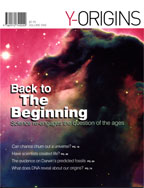A FINELY TUNED PLANET
You may believe that aliens have sent life to Earth from a far distant galaxy (the premise of that memorable drama from 2004, AVP: Alien vs. Predator). You may believe that the government is hiding something outer spatial in Nevada’s mysterious Area 51. Or you may simply believe that there is undoubtedly intelligent life on other planets. In any case, we have all been raised on the assumption that, given enough time, intelligent life will spring up anywhere in the cosmos (with perhaps a few more eyeballs or reptilian features). Yet new evidence from cosmology is really saying the opposite.
The reality is that we live on an extremely rare planet perfectly positioned in an extre-mely rare solar system, ideally located in an extremely rare galaxy, within a highly improbable universe. Let’s look at our rare Earth.
Water. Earth has an abundance of water, which is essential for life. Mars once had water and therefore might have harbored life. But water is only one of many requirements for life.
Oxygen. Earth is the only planet in our solar system in which we can breathe. Attempting to breathe on other planets, such as Mars or Venus, would be instantly fatal, Mars having virtually no atmosphere and Venus having mostly carbon dioxide and almost no oxygen.
Earth’s distance from the Sun. If the Earth were merely one percent closer to the Sun, the oceans would vaporize, preventing the existence of life. On the other hand, if our planet were just two percent farther from the Sun, the oceans would freeze and the rain that enables life would be nonexistent.
Plate tectonic activity on Earth. Scientists have determined that if the plate tectonic activity were greater, human life could not be sustained and greenhouse-gas reduction would overcompensate for increasing solar luminosity. Yet, if the activity was smaller, life-essential nutrients would not be recycled adequately and greenhouse-gas reduction would not compensate for increasing solar luminosity.
Ozone level in the atmosphere. Life on Earth survives because the ozone level is within the safe range for habitation. However, if the ozone level were either much less or much greater, plant growth would be inadequate for human life to exist.
For life to exist, these, as well as many other conditions needs to be just right.15
Back | Endnotes | Next
|




